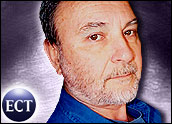
At 5 a.m., German police kicked in the front door of the modest apartmenthouse in working-class Essen and, guns drawn, ordered an unsuspectingfamily out of bed. Then they hauled off a 22-year-old college student ashis stunned parents watched.
The intro is from a Boston Globe story that continues: “This wasn’t a scene from a big-screen police thriller. But it had Hollywood’s fingerprints all over it.”
Hollywood — the catch-all for the entertainment industry in all its shapes and guises and its many and various “trade” organizations — routinely uses genuine international police and enforcement agencies as unpaid labor, backed up by pseudo movie and record industry police who do their best to look and act like the real thing. And they play their roles admirably because many, if not most, of them were once real police officers.
What these incidents are is a raid on pirated Hollywood entertainment.
This goes on all over the world from Asia to Australia to the US of A.It’s the way the entertainment industry tries to make absolutely sure itsmovie and music enterprises remain the multibillion-dollar concernsthat they are today, loud complaints to the contrary notwithstanding.
Never a Murmer
It’s an appalling reality, but there’s never a murmur from theadministrations in the countries involved, or from the taxpayers whosemoney pays for the police forces suborned by the entertainment industry.
Using the Motion Picture Association of America and Recording Industry Association of America and other organizations around the world as its fronts, Hollywood does more orless what it wants everywhere.
The German incident came about through the efforts of the GermanAnti-Piracy Federation, “a private investigating organization funded byU.S. studios, German independent film companies, and electronics firms[that] worked with law enforcement to stage the March raid on 800 locationsacross Germany,” as the Globe says, also pointing out that the MPAA hashelped bankroll 57 antipiracy organizations around the world that aredoing the investigative legwork most law-enforcement agencies considertoo low a priority to pursue on their own.
The MPAA won’t divulge the size of its investment in the groups, the story adds.
Operating Expense
That’s because the “investment” would be better described as an operatingexpense.
The entertainment industry owns and funds it all. It tells the groupswhat to do and when to do it. And through these so-called trade organizations andthrough high-echelon supporters around the world, backed by minions working in the shadows, persuades, cajoles, bribes, schmoozes people in publicly funded organizations and international administrations into doing its dirty work.
It also controls the mainstream media so its message is the one that’sheard most loudly and most often.
But it’s not only Germany.
“Mexican police were involved in violent clashes with criminal gangs inMexico City’s notorious Tepito market in a raid which netted hundreds ofthousands of discs and equipment along with firearms and illegal drugs,”brags Hollywood’s International Federation of PhonographicIndustries.
Hollywood’s Interests
And in Peru, “A huge seizure…involving 1,000 police officers nettedno fewer than 1 million burned CD-R discs in the famous ‘Hueco’ fleamarket. During the operation, over 400 stands were raided and 10 peoplewere arrested.”
It’s almost as if the police forces around the world don’t haveanything better to do than to look after Hollywood’s interests.
But Hollywood’s bottom line is also its Achilles heel.
The record industry is far from being in dire straits, as it claims, butthanks to the advent of the Internet and, through it, P2P and other forms ofinstant communication, for the first time in its history, it’s completely lost control over the people who make up what used to be called its “consumer bases.”
Standing in Line
In the 21st century, “consumers” are well on their way to forcing BigMusic to dance to their tunes. And the same thing is starting to happento the movie studios.
In the last century, the entertainment industry way was the only way. But this is 2004 — the first decade of the digital age — and Hollywood now has to stand in line.
More to come, as they say in medialand.
Jon Newton, a TechNewsWorld columnist, founded and runs p2pnet.net, a daily peer-to-peer and digital media news site focused on issues surrounding file-sharing, the entertainment industry and distributed computing. p2pnet is based in Canada where sharing music online is legal.

































